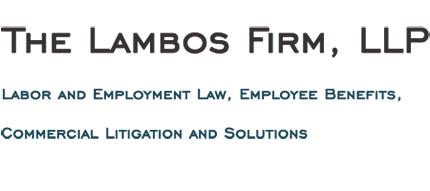Administrative Law and Regulatory Affairs
The Lambos Firm, LLP‘s Administrative Law and Regulatory Affairs practice is consistent with the firm’s holistic approach to client service. The firm is actively engaged in all aspects of federal and state regulation when clients’ interests are at issue. Most notably, these issues involve the maritime industry and attempts by federal and state regulators either to intervene in or to circumscribe the method and manner in which the containerized cargo-handling industry transports cargo.
Port Security
One of the most significant issues impacting the nation today concerns potential threats to our security by utilizing the ports as a conduit for terrorist activity. A transportation security incident at one of our nation’s ports could create an economic disaster for the entire country. The Lambos Firm, LLP has been directly involved with the effort to enact reasonable federal port-security measures that will not impede the efficient flow of commerce. In addition, the firm has been actively involved in helping to shape anticipated Coast Guard regulations for maritime security. Moreover, the firm has been at the forefront in exploring issues concerning the costs of this new maritime-security regime.
Safety and Health
Among matters addressed by the firm on behalf of the maritime industry is the Occupational Safety and Health Administration’s (OSHA) efforts to limit the ability of the industry to employ currently accepted technology in cargo-handling practices. This is an issue of global significance as the volume of containerized cargo is projected to grow exponentially in the next thirty years. Terminals worldwide must be able to utilize safe and efficient cargo-handling techniques without undue or gratuitous regulation.
The Lambos Firm, LLP has also been involved in successful legal challenges to promulgated agency regulations. This includes a challenge to the application of OSHA’s general industry standard for powered-industrial-truck-operator training to the maritime industry. The OSHA standard, if applied to the maritime industry, would have been in feasible to implement in the multiemployer maritime setting. In addition, the standard would have been inappropriate for the unique equipment utilized and would have cost millions in excess over OSHA’s estimates for the entire country. As a result of the litigation and ultimate settlement, the maritime industry has a reasonable training standard that suits the complex nature of the maritime workplace and a state-of-the-art training program that appropriately addresses industry needs.
The firm has also been a steadfast advocate for the maritime industry with regard to other safety-related issues, including ergonomics and personal protective equipment.
Cargo Transportation
Dredging
Waterborne transportation of cargo is of critical importance to the national and global economy. Often issues arise that negatively impact the ability to deliver cargo. Certain ports in this country require varying amounts and types of dredging activity in order to maintain needed channel depths for servicing vessels. The Lambos Firm, LLP has been proactive in the ongoing campaign to ensure the continued vitality of our nation’s ports. This activity has involved practice before both state and federal environmental protection agencies as well as significant litigation.
Inland Cargo Transportation
Waterborne cargo does not simply stop at the water’s edge. The in-land leg of the inter modal system presents its own challenges. The Lambos Firm, LLP has been at the forefront of issues before the U.S. Department of Transportation and various state legislatures to protect the maritime industry against threats to its ability to move its equipment and cargo.
Labor Policy and Legislation
Shipping Act
The Lambos Firm, LLP represented the long-shore industry in obtaining Congress’s enactment of the Maritime Labor Agreements Act of 1980, which adopted a streamlined and expedited process for challenging before the Federal Maritime Commission assessment agreements for the funding of employee fringe benefits in the maritime industry on other than a man-hour basis. This legislation removed the obstacle that had previously existed of having to obtain pre-implementation Commission approval, thus hindering the collective-bargaining process. The provisions of the MLAA were continued in effect in the subsequent overhaul of the nation’s shipping laws, when Congress passed the Shipping Act of 1984. In addition, the firm also represents entities subject to the Shipping Act that are lawfully permitted to enter into cooperative working agreements to address among other things matters that relate to promoting environmentally sensitive, efficient, and secure marine terminal operations.
Waterfront Commission
The Lambos Firm, LLP has represented the long-shore industry before the Waterfront Commission of New York Harbor, a bi-state agency established in accordance with an act of Congress, to regulate the employment of members of the various long-shore crafts working in the Port of New York and New Jersey. The firm has assisted the industry in drafting and obtaining amendments to the Waterfront Commission Act, resulting in the industry adding thousands of employees over the last twenty-five years. The firm has also assisted the industry in preparing its presentations for public hearing before the Waterfront Commission. Moreover, the firm has also assisted individual companies in the stevedore license application process as well as with audits regarding company assessments.
Tax Issues
Tax-exempt status is of extreme importance to employee benefit plans and management associations. The Lambos Firm, LLP succeeded where others did not in obtaining the approval of the National Office of the Internal Revenue Service to exempt Guaranteed Annual Income benefits paid in the Port of New York and New Jersey from social security (FICA) and unemployment (FUTA) taxes. The firm also obtained the approval of the IRS’s National Office to continued tax-exempt status for a conduit welfare plan providing financial support to long shore healthcare plans in various East Coast ports.
